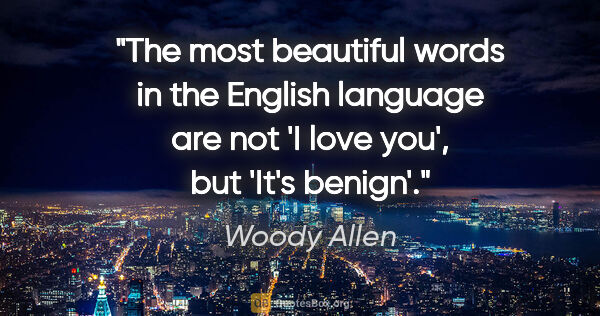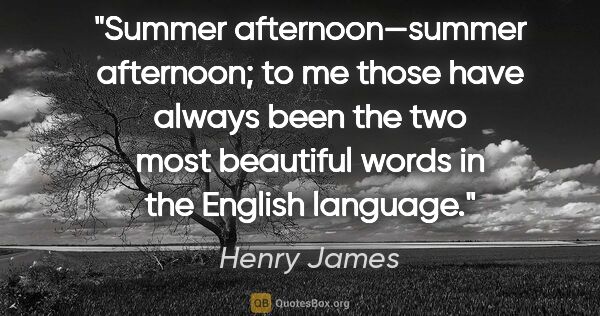English Words Quotes (page 2)
Very” is the most useless word in the English language and can always come out. More than useless, it is treacherous because it invariably weakens what it is intended to strengthen. For example, would you rather hear the mincing shallowness of “I love you very much” or the heart-slamming intensity of “I love you”?
Florence King
my beloved Eudosia [a member of Buckley's household staff], who is Cuban, very large, quite old, and altogether superstitious, and speaks only a word or two of English (even though she has been with us for 19 years), is quite certain that the gentleman who raped the 16-year-old girl in New Caanan three years ago and escaped has successfully eluded the police only because of his resourceful determination to ravage Eudosia before he dies. Accordingly she demanded, and I gave her, a shotgun,...
William F. Buckley, Jr.
The moral world has no particular objection to vice, but an insuperable repugnance to hearing vice called by its proper name. A polite public will no more bear to read an authentic description of vice than a truly-refined English or American female will permit the word 'breeches' to be pronounced in her chaste hearing. And yet, madam, both are walking the world before our faces every day without much shocking us. If you were to blush every time they went by, what complexions you would have!
William Makepeace Thackeray



But are there philosophical problems? The present position of English philosophy - my point of departure - originates, I believe, in the late Professor Ludwig Wittgenstein's doctrine that there are none; that all genuine problems are scientific problems; that the alleged propositions or theories of philosophy are pseudo-propositions or pseudo-theories; that they are not false (if they were false, their negations would be true propositions or theories) but strictly meaningless combinations of...
Karl Popper
I notice that you use plain, simple language, short words and brief sentences. That is the way to write English - it is the modern way and the best way. Stick to it; don't let fluff and flowers and verbosity creep in. When you catch an adjective, kill it. No, I don't mean utterly, but kill most of them - then the rest will be valuable. They weaken when they are close together. They give strength when they are wide apart. An adjective habit, or a wordy, diffuse, flowery habit, once fastened...
Mark Twain
From that original colony sprang seven names that still feature on the landscape: Roanoke (which has the distinction of being the first Indian word borrowed by English settlers), Cape Fear, Cape Hatteras, the Chowan and Neuse Rivers, Chesapeake, and Virginia. (Previously, Virginia had been called Windgancon, meaning "what gay clothes you wear" - apparently what the locals had replied when an early reconnoitering party had asked the place's name.)
Bill Bryson

Grace has to be the loveliest word in the English language. It embodies almost every attractive quality we hope to find in others. Grace is a gift of the humble to the humiliated. Grace acknowledges the ugliness of sin by choosing to see beyond it. Grace accepts a person as someone worthy of kindness despite whatever grime or hard-shell casing keeps him or her separated from the rest of the world. Grace is a gift of tender mercy when it makes the least sense.
Charles R. Swindoll
And then it occurs to me. They are frightened. In me, they see their own daughters, just as ignorant, just as unmindful of all the truths and hopes they have brought to America. They see daughters who grow impatient when their mothers talk in Chinese, who think they are stupid when they explain things in fractured English. They see that joy and luck do not mean the same to their daughters, that to these closed American-born minds "joy luck" is not a word, it does not exist. They see...
Amy Tan